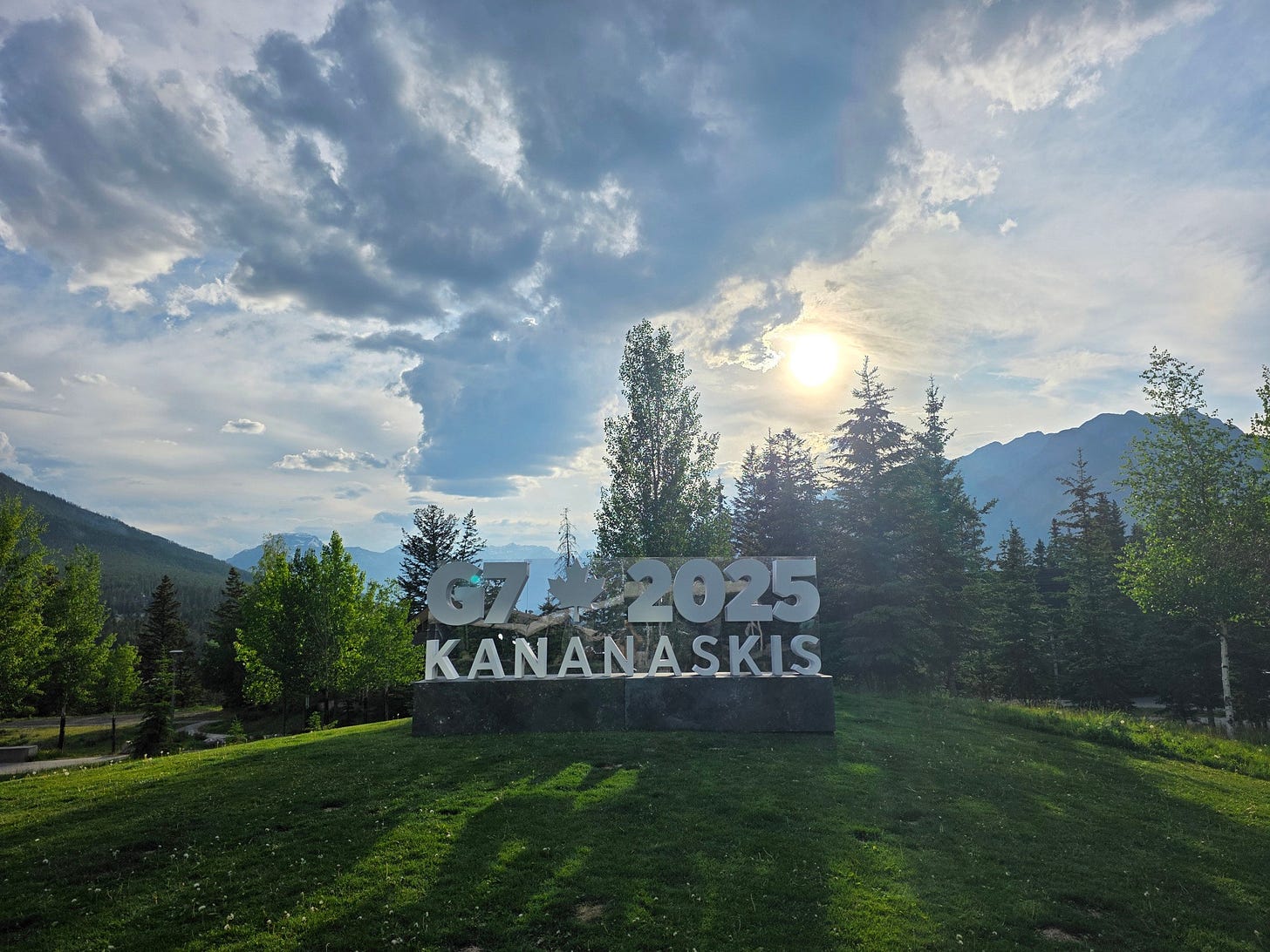The Summit at the End of the World
Greetings from the G6+1 in Kananaskis
"I don't think we should fool ourselves," Prime Minister Stephen Harper said in 2013. "This is the G7 plus one."
The Canadian leader made the comments on the sidelines of the G8 summit in Northern Ireland, just as patience with the plus one was running out.
Seven of the eight leaders represented at the high-level summit had come to a clear consensus: Syrian dictator Bashar al-Assad was a tyrant, a war criminal, and he had to go, effectively backing the rebels advancing towards Damascus. But it was the eighth member, Russian President Vladimir Putin, who held out. Insisting that there was “blood is on the hands of both parties,” he rejected calls to oust the autocrat.
It was foreshadowing for what was to come.
Just over six months after the summit wrapped, protesters in Ukraine succeeded in overthrowing the corrupt and kleptocratic regime in Kyiv. Their murderous president, Viktor Yanukovich, fled to Russia. As his pro-Russian state melted away, Putin gave the orders to his intelligence services: Prepare plans to invade.
In February, 2014, Russian operatives began fomenting unrest in the border regions of Ukraine. In a matter of weeks, Russian special forces seized Crimea and a strip of the Donbas region. The invasion of Ukraine had begun.
The next leaders’ summit was slated for that June in Sochi. But, in late March, President Barack Obama convened an ad hoc meeting of the seven and came to consensus: Russia would be disinvited, and the summit would be moved to Brussels.
“So be it,” sniffed Russian Foreign Minister Sergei Lavrov.
Moscow’s annexation of Crimea and hostilities in the Ukrainian border regions started a process that would culminate in its full-scale invasion eight years later. The ill-advised aggression prompted a level of unexpected international liberal unity. America organized arms transfers, Canada led banking sanctions, France raced to pull Europe together, Japan became one of the single-largest funders of Ukraine’s self-defence — it was hard to find a freedom-loving country that wasn’t investing in Ukraine’s safety, in part as an investment in their own sovereignty and the global order. It was a collective investment in the idea that borders couldn’t be redrawn by force.
To allow Russia’s unchecked aggression, to reward it by treating Moscow as a legitimate state concerned with internal norms, was unconscionable.
On Monday, standing at the G7 summit in Kananaskis, Donald Trump evoked this sordid history as he lamented the plight of Vladimir Putin.
“You want to have people that you can talk to, you know?” Trump said. “Putin speaks to me, he doesn't speak to anybody else. He doesn't want to talk, because he was very insulted when he got thrown out of the G8, as I would be, as you would be, as anybody would be. He was very insulted.”
“He was thrown out by Trudeau,” Trump continued, wrongly, “who convinced one or two people — along with Obama. He was thrown out, and he's not a happy person about it, I can tell you that. He basically doesn't even speak to the people that throw him out, and I agree with him.”
Trump stopped short of endorsing Putin’s return. “I'm not saying he should, at this point, because too much water's gone over the dam,” he said. “Maybe.” Perhaps, he mused, Beijing should round out the G8. “Not a bad idea,” he said, “I don't mind that.”
This week, on a very special Bug-eyed and Shameless, a dispatch from on the ground at yet another G7 summit thrown into tumult by Donald Trump: His changing tune on striking Iran, the efforts Canada made to keep him happy, and how Trump scuttled a statement on Ukraine to avoid insulting his friend Vladimir.
Mark Carney tried awfully hard to Trump-proof the G7 summit.
Gone were the mentions of climate change, in were discussions of migration and energy. When the president began rambling about the need to bring Vladimir Putin back into the G7 fold, Carney hurried out the assembled media and pushed the conversation to trade. Carney opted against having a single joint communiqué, the kind Trump balked at at the summit in Quebec seven years prior, instead opting for a series of issue-specific statements that Trump could get behind.
The whole gang of world leaders tiptoed around the mercurial American, heaping praise on him where they could and only obliquely chiding him, never by name, where warranted.
When Trump opened his binder to reveal his beautiful trade deal with the United Kingdom, spilling pages into the ground, Prime Minister Keir Starmer scrambled to his knees to pick them up. When Trump first walked in the room to meet Carney, the Canadian made sure to wish him a belated happy birthday and insist that there could be no G7 without America. When questions swirled around Trump’s planned exit and the possibility of American airstrikes on Iran, French President Emmanuel Macron leapt to praise Trump’s diplomatic acumen.
"There was an offer made for a meeting," between Trump and the Iranian government, Macron said in a scrum with reporters. "If the United States can obtain a ceasefire, it is a very good thing," he added.
Trump’s team had spent all day insisting that he would sign no joint statement: At dinner, however, Carney impressed on him the importance of having a unified voice to reduce the likelihood of war in the Middle East. They hammered out a compromise: The statement would call for a ceasefire in Gaza but “de-escalation” in Iran, while also affirming “that Israel has a right to defend itself” and voicing their support for the “security of Israel.” Trump, thanks to Carney, signed.




